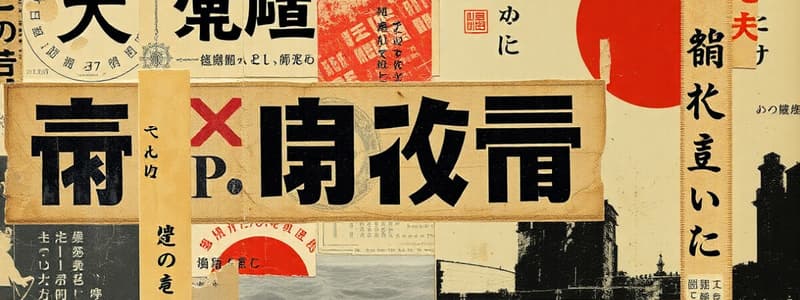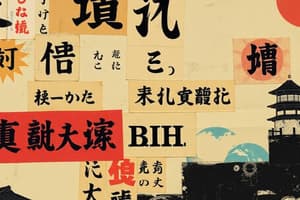Podcast
Questions and Answers
Which of the following situations would be most appropriate to use the phrase 'いただきます' (itadakimasu)?
Which of the following situations would be most appropriate to use the phrase 'いただきます' (itadakimasu)?
- When leaving your house.
- When meeting someone for the first time.
- After finishing your homework.
- Before starting a meal. (correct)
What is the most appropriate response when someone says 'どうぞ' (douzo) to you?
What is the most appropriate response when someone says 'どうぞ' (douzo) to you?
- Say 'ありがとう' (arigatou) and accept the offer. (correct)
- Ignore the person.
- Say 'おはようございます' (ohayou gozaimasu).
- Say 'さようなら' (sayounara).
Which of these actions is associated with the verb 'みがく' (migaku)?
Which of these actions is associated with the verb 'みがく' (migaku)?
- Driving a 'くるま' (kuruma).
- Brushing your 'は' (ha). (correct)
- Eating 'ピザ' (piza).
- Listening to 'おんがく' (ongaku).
If someone says 'おなかがいっぱい' (onaka ga ippai), what does it likely mean?
If someone says 'おなかがいっぱい' (onaka ga ippai), what does it likely mean?
You want to ask your friend '山田' (Yamada) if they like 'サッカー' (sakkaa). Which of the following questions is most appropriate?
You want to ask your friend '山田' (Yamada) if they like 'サッカー' (sakkaa). Which of the following questions is most appropriate?
If you want to tell someone 'I will return after work', what would be the most appropriate way to say it, using the word 'かえって' (kaette)?
If you want to tell someone 'I will return after work', what would be the most appropriate way to say it, using the word 'かえって' (kaette)?
What is something you might do with a 'じしょ' (jisho)?
What is something you might do with a 'じしょ' (jisho)?
Which of the following is an example of something described as 'あつい' (atsui)?
Which of the following is an example of something described as 'あつい' (atsui)?
What is the purpose of 'じこしょうかい' (jikoshoukai)?
What is the purpose of 'じこしょうかい' (jikoshoukai)?
Complete the sentence with the correct word: 私は毎日___を飲みます。(Watashi wa mainichi ___ o nomimasu.) I drink ___ every day.
Complete the sentence with the correct word: 私は毎日___を飲みます。(Watashi wa mainichi ___ o nomimasu.) I drink ___ every day.
If someone asks you 'いくつ' (ikutsu)ですか, what are they likely asking?
If someone asks you 'いくつ' (ikutsu)ですか, what are they likely asking?
In what situation might you hear someone say 'もしもし' (moshi moshi)?
In what situation might you hear someone say 'もしもし' (moshi moshi)?
Which of the following words is the opposite of 'ちかい' (chikai)?
Which of the following words is the opposite of 'ちかい' (chikai)?
Which word best describes the action of using 'じしょ' (jisho) to find the meaning of a word?
Which word best describes the action of using 'じしょ' (jisho) to find the meaning of a word?
What is a common activity associated with 'しゅくだい' (shukudai)?
What is a common activity associated with 'しゅくだい' (shukudai)?
Which of these items would you most likely keep in a 'さいふ' (saifu)?
Which of these items would you most likely keep in a 'さいふ' (saifu)?
You want to tell someone that a certain 'レストラン' (resutoran) is 'ゆうめい' (yuumei). How would you structure your sentence?
You want to tell someone that a certain 'レストラン' (resutoran) is 'ゆうめい' (yuumei). How would you structure your sentence?
Complete the sentence: '私の___は音楽です' (Watashi no ___ wa ongaku desu).
Complete the sentence: '私の___は音楽です' (Watashi no ___ wa ongaku desu).
What action is most closely associated with a 'は' (ha)?
What action is most closely associated with a 'は' (ha)?
You want to say 'I will take a shower'. Which verb best completes the sentence: 'シャワーを___。(Shawaa o ___.)'?
You want to say 'I will take a shower'. Which verb best completes the sentence: 'シャワーを___。(Shawaa o ___.)'?
Flashcards
あつい (atsui)
あつい (atsui)
Hot
あたらしい (atarashii)
あたらしい (atarashii)
New
あぶない (abunai)
あぶない (abunai)
Dangerous
あります (arimasu)
あります (arimasu)
Signup and view all the flashcards
いく (iku)
いく (iku)
Signup and view all the flashcards
いくつ (ikutsu)
いくつ (ikutsu)
Signup and view all the flashcards
いえ (ie)
いえ (ie)
Signup and view all the flashcards
います (imasu)
います (imasu)
Signup and view all the flashcards
うるさい (urusai)
うるさい (urusai)
Signup and view all the flashcards
おとうと (otouto)
おとうと (otouto)
Signup and view all the flashcards
おかあさん (okaasan)
おかあさん (okaasan)
Signup and view all the flashcards
おなかがいっぱい (onaka ga ippai)
おなかがいっぱい (onaka ga ippai)
Signup and view all the flashcards
おんがく (ongaku)
おんがく (ongaku)
Signup and view all the flashcards
かえる (kaeru)
かえる (kaeru)
Signup and view all the flashcards
かう (kau)
かう (kau)
Signup and view all the flashcards
かく (kaku)
かく (kaku)
Signup and view all the flashcards
がっこう (gakkou)
がっこう (gakkou)
Signup and view all the flashcards
ギター (gitaa)
ギター (gitaa)
Signup and view all the flashcards
きく (kiku)
きく (kiku)
Signup and view all the flashcards
きれい (kirei)
きれい (kirei)
Signup and view all the flashcards
Study Notes
- あつい (atsui): means "hot".
- あたらしい (atarashii): means "new".
- あぶない (abunai): means "dangerous".
- アメリカ (amerika): refers to "America".
- あります (arimasu): means "to have" or "there is" (inanimate objects).
- いく (iku): means "to go".
- いくつ (ikutsu): means "how old" or "how many".
- いえ (ie): means "house".
- います (imasu): means "to be" (animate objects).
- いる (iru): means "to be" (animate objects).
- うるさい (urusai): means "noisy".
- うれる (ureru): means "to sell".
- おとうと (otouto): refers to "younger brother".
- おかあさん (okaasan): refers to "mother".
- おなかがいっぱい (onaka ga ippai): means "full" (stomach).
- おんがく (ongaku): means "music".
- かえる (kaeru): means "to return".
- かう (kau): means "to buy".
- かえって (kaette): means "after returning".
- かく (kaku): means "to write".
- がっこう (gakkou): means "school".
- ギター (gitaa): refers to "guitar".
- きく (kiku): means "to listen".
- きれい (kirei): means "beautiful" or "clean".
- きょう (kyou): means "today".
- きょうしつ (kyoushitsu): means "classroom".
- くらい (kurai): means "dark".
- くるま (kuruma): means "car".
- けっこん (kekkon): means "marriage".
- げつ (getsu): means "month".
- こども (kodomo): means "child".
- コーヒー (koohii): refers to "coffee".
- こんにちは (konnichiwa): means "hello".
- こんしゅう (konshuu): means "this week".
- さいふ (saifu): means "wallet".
- サッカー (sakkaa): refers to "soccer".
- さむい (samui): means "cold".
- しゃしん (shashin): means "picture".
- シャワー (shawaa): refers to "shower".
- しゅくだい (shukudai): means "homework".
- じこしょうかい (jikoshoukai): means "self-introduction".
- じしょ (jisho): means "dictionary".
- すくない (sukunai): means "few" or "little".
- する (suru): means "to do".
- セーター (seetaa): refers to "sweater".
- タクシー (takushii): refers to "taxi".
- たろう (tarou): is a common male name, "Tarou."
- ダンス (dansu): refers to "dance".
- ちかい (chikai): means "near".
- ちず (chizu): means "map".
- ちち (chichi): refers to "father".
- チケット (chiketto): refers to "ticket".
- つくる (tsukuru): means "to make".
- つける (tsukeru): means "to turn on".
- つとめる (tsutomeru): means "to work for".
- でる (deru): means "to leave" or "depart".
- でんき (denki): means "electricity" or "light".
- でんしゃ (densha): means "train".
- どちら (dochira): means "which".
- とる (toru): means "to take".
- ともだち (tomodachi): means "friend".
- とうきょうえき (toukyoueki): refers to "Tokyo Station."
- どう (dou): means "how".
- どうぞ (douzo): means "please" or "here you are".
- はがき (hagaki): means "postcard".
- はいる (hairu): means "to enter".
- はこ (hako): means "box".
- はじめる (hajimeru): means "to begin".
- はなす (hanasu): means "to speak".
- はやい (hayai): means "fast" or "early".
- はは (haha): refers to "mother".
- へや (heya): means "room".
- ほてる (hoteru): refers to "hotel".
- ほん (hon): means "book".
- まち (machi): means "town".
- まつ (matsu): means "to wait".
- まいにち (mainichi): means "every day".
- まえ (mae): means "before".
- みず (mizu): means "water".
- みる (miru): means "to see".
- みがく (migaku): means "to brush, polish".
- みなさん (minasan): means "everyone".
- もらう (morau): means "to receive".
- もしもし (moshi moshi): means "hello" (on the phone).
- もんだい (mondai): means "question" or "problem".
- やすむ (yasumu): means "to rest" or "to be absent".
- やまだ (yamada): is a common Japanese surname, "Yamada".
- ゆうめい (yuumei): means "famous".
- ゆうべ (yuube): means "last night".
- よこ (yoko): means "beside".
- よる (yoru): means "night".
- りょうり (ryouri): means "cooking".
- れい (rei): means "example".
- かいしゃ (kaisha): means "company, office".
- しがつ (shigatsu): means "April".
- いそがしい (isogashii): means "busy".
- いま (ima): means "now".
- えき (eki): means "station".
- にしぐち (nishiguchi): means "west exit".
- まい (mai): is a counter for flat objects.
- わすれる (wasureru): means "to forget".
- うすい (usui): means "thin".
- とうきょうえき (Toukyou eki): means "Tokyo Station".
- は (ha): means "tooth".
- きって (kitte): means "stamp".
- おいしい (oishii): means "delicious".
- いす (isu): means "chair".
- いっかげつ (ikkagetsu): means "one month".
- かみ (kami): means "hair".
- きる (kiru): means "to cut".
- こうちゃ (koucha): means "black tea".
- すき (suki): means "to like".
- あに (ani): means "older brother".
- じょうず (jouzu): means "skillful, good at".
- みなみ (Minami): is a given name.
- ひるごはん (hirugohan): means "lunch".
- カレー (karee): means "curry".
- ねこ (neko): means "cat".
- ベッド (beddo): means "bed".
- しゅみ (shumi): means "hobby".
- れんしゅう (renshuu): means "practice".
- ふじさん (Fuji-san): refers to "Mt. Fuji".
- まいあさ (maiasa): means "every morning".
- あさごはん (asagohan): means "breakfast".
- あびる (abiru): means "to take (a shower)".
- レストラン (resutoran): means "restaurant".
- やすい (yasui): means "cheap".
- たべる (taberu): means "to eat".
- ピザ (piza): means "pizza".
- テニス (tenisu): means "tennis".
- こうえん (kouen): means "park".
- いう (iu): means "to say".
Studying That Suits You
Use AI to generate personalized quizzes and flashcards to suit your learning preferences.




